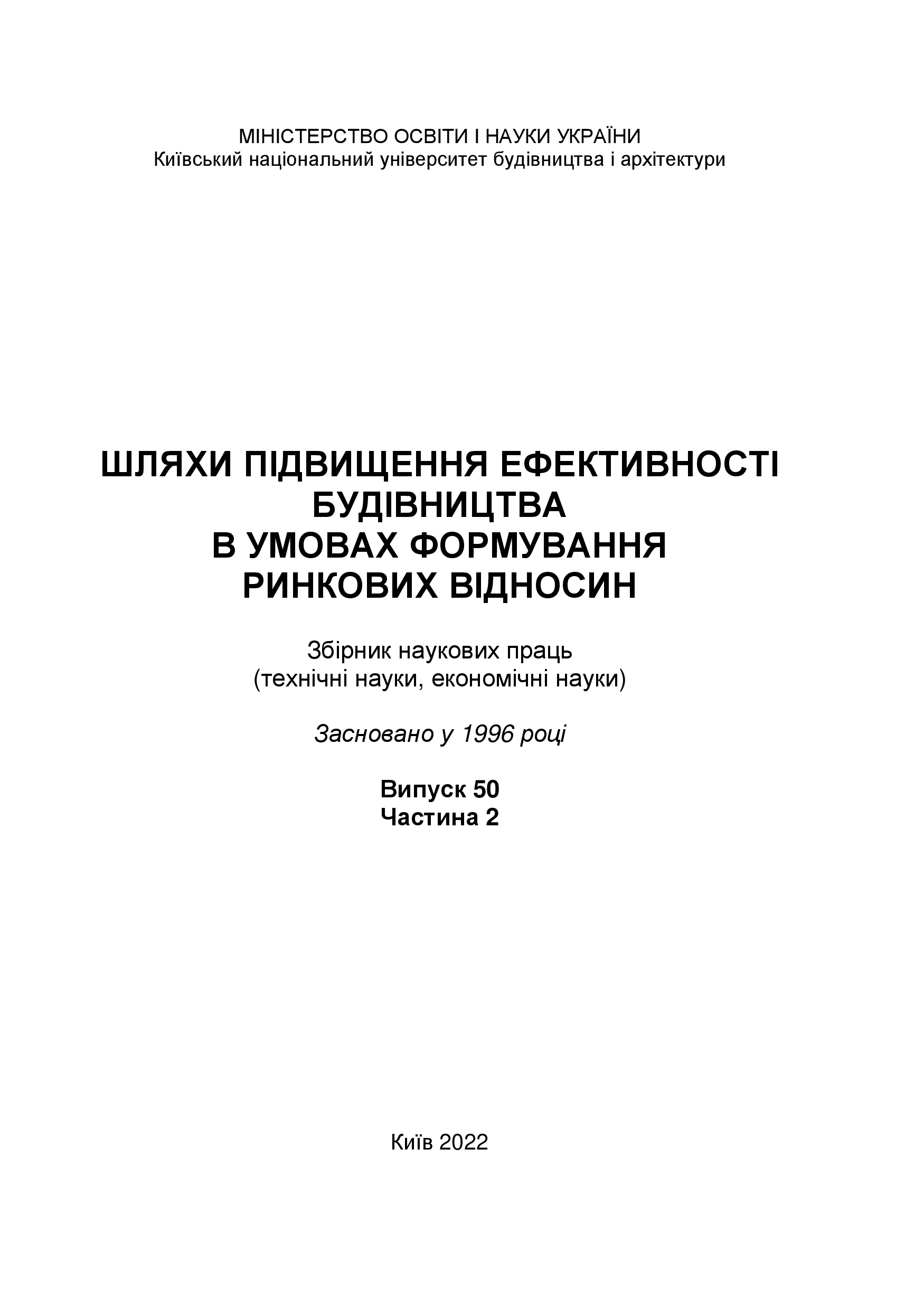Reengineering of business processes of a construction enterprise in conditions of digitalization
DOI:
https://doi.org/10.32347/2707-501x.2022.50(2).251-265Keywords:
business process reengineering, construction enterprise, competitiveness, expert assessment, CSFAbstract
The etymology of the term "reengineering" was studied, which means a set of methods that the company uses to design and redesign the business in accordance with strategic requirements, where the key aspect is the improvement of the financial condition. Under the influence of digitalization, companies must constantly change in order to meet the needs of consumers and be competitive. At the same time, it is important to model, analyze and redesign complex and outdated business processes that do not meet modern requirements in the conditions of fierce competition on the world market of products and services.
The article considers the issue of formalization of reengineering stages, at which business processes are selected and evaluated, taking into account the impact of digitalization on them. A methodology for choosing business processes based on the examination of the most important success factors is proposed. The choice is made on the basis of the analysis of the integral assessment of business processes, taking into account the variability of many experts.
A formalized methodology for the first stage of business process reengineering is presented, which pays attention to organized interaction between company specialists and consultants. This approach is designed to reduce the subjectivity of business process assessments, compensating for individual eliminations and increasing the objectivity of the assessment.
The formalized nature of the methodology, as well as versatile analysis, including the reasoned reasoning of specialists and managers, contribute to increasing the validity of the decisions made regarding the reengineering of business processes. This is important in order for the changes developed in the processes to be the most effective and meet the strategic goals of the enterprise.
Adherence to these principles can help create a more reliable methodology for business process reengineering, providing more accurate and informed assessments, and therefore more effective process improvements
References
Гончарова О. М. Реінжиніринг бізнес-процесів як спосіб підвищення ефективності управління. Ефективна економіка. 2012. № 2. Режим доступу: http://nbuv.gov.ua/UJRN/efek_2012_2_27
Грабчак Д.В., Болебрух О.С., Деркач А.Є., Ровенський А.Є., Гуляєв Д.А. Система управління проектом реінжинірингу виробничих процесів на підприємстві. The Scientific Heritage, 2021. №61-1.
Чуприна Х., Валяев О., Деркач, А. Удосконалення системи управління оборотними активами підприємства на базі концепції just in time. Економіка та суспільство, 2021. (26). https://doi.org/10.32782/2524-0072/2021-26-80
Chupryna K., Biloshchytskyi A., Prykhodko D., Mironov O., Malykhin M. Substantiation and Development of Comprehensive Measures to Improve the Activities of Construction Companies SIST 2022 - 2022 International Conference on Smart Information Systems and Technologies, Proceedings, 2022. DOI: 10.1109/SIST54437.2022.9945762
Chupryna І., Ryzhakova G.,Chupryna K., Tormosov R., Gonchar V. Designing a toolset for the formalized evaluation and selection of reengineering projects to be implemented at an enterprise. Eastern-European Journal of Enterprise Technologies, 2022, 1(13-115), pp. 6–19. DOI: 10.15587/1729-4061.2022.251235
Hosley W. N. The application of artificial intelligence software to project management / Project Management Journal, 1978. 18(3), 73–75
Harris R.M., Shaffer S.C., Stokes J., Goldstein D. Application of expert systems in project management decision aiding. Scientific and Technical Report. 1978.243 р.
Чуприна Х.., Іщенко Т., Савчук Т., Дикий О., Поколенко В., Веремєєва Т. Оновлення інструментарію економіко-управлінської реконфігурації бізнес-процесів будівельних підприємств у контексті сучасної парадигми цифровізації економіки. Управління розвитком складних систем, 2021. (46). Рр. 131–140.
Чуприна Х.М., Чуприна Ю.А., Бородавко М.В., Гавріков Д.О. Стратегії реконфігурації бізнес-процесів будівельних підприємств. Управління розвитком складних систем. 2020. № 41. С. 169 – 174.
Honcharenko Т., Chupryna Y., Ivakhnenko I., Zinchenco M., Tsyfra T. Reengineering of the construction companies based on BIM-technology. International Journal on Emerging Trends in Engineering Research. 2020. vol. 8, issue 8, pp. 4166-4172. https://doi.org/10.30534/ijeter/2020/22882020
Stetsenko, S. P. & all. Management of Adaptation of Organizational and Economic Mechanisms of Construction to Increasing Impact of Digital Technologies on the National Economy. Journal of Reviews on Global Economics. 2020. № 9. Р. 149-164
Stetsenko, S.P. & all. The interrelation of digital technologies and organizational and economic mechanisms in construction: adaptation to change management. International Review, 2021. 1, 21-31.
Fedun Igor; Stetsenko Sergii; Tsyfra Tatiana; Vershygora Dmytro; Valchuk Bohdan; Andriiv Valentyna. Innovative Software Tools for Effective Management of Financial and Economic Activities of the Organization 2023. Book chapter Springer URL: https://doi.org/10.1007/978-3-031-08093-7_2
Bielienkova, O.; Novak, Y.; Matsapura, O.; Zapiechna, Y.; Kalashnikov D.; Dubinin D. Improving the Organization and Financing of Construction Project by Means of Digitalization. International Journal of Emerging Technology and Advanced Engineering. 2022. Pp. 108-115
Гойко А.Ф. Методичні питання оцінки ефективності роботи будівельного підприємства. Шляхи підвищення ефективності будівництва в умовах формування ринкових відносин. 2022. Вип. 49(1). С. 148-156.
Nikolaiev V.P. Technical and economic aspects of real estate properties: collective monograph. Lviv-Toruń: Liha-Pres, 2019. 124 p.
Khomenko O.М, Malykhina О.М. The modern paradigm of reengineering as a tool for innovation and investment reconfiguration of business processes of construction enterprises. Nauka i studia, 2019. Vol.12. Pp. 13-19.
Downloads
Published
How to Cite
Issue
Section
License

This work is licensed under a Creative Commons Attribution 4.0 International License.
Authors who publish with this journal agree to the following terms:
- Authors retain copyright and grant the journal right of first publication with the work simultaneously licensed under a Creative Commons Attribution License that allows others to share the work with an acknowledgement of the work's authorship and initial publication in this journal.
- Authors are able to enter into separate, additional contractual arrangements for the non-exclusive distribution of the journal's published version of the work (e.g., post it to an institutional repository or publish it in a book), with an acknowledgement of its initial publication in this journal.
- Authors are permitted and encouraged to post their work online (e.g., in institutional repositories or on their website) prior to and during the submission process, as it can lead to productive exchanges, as well as earlier and greater citation of published work (See The Effect of Open Access).

